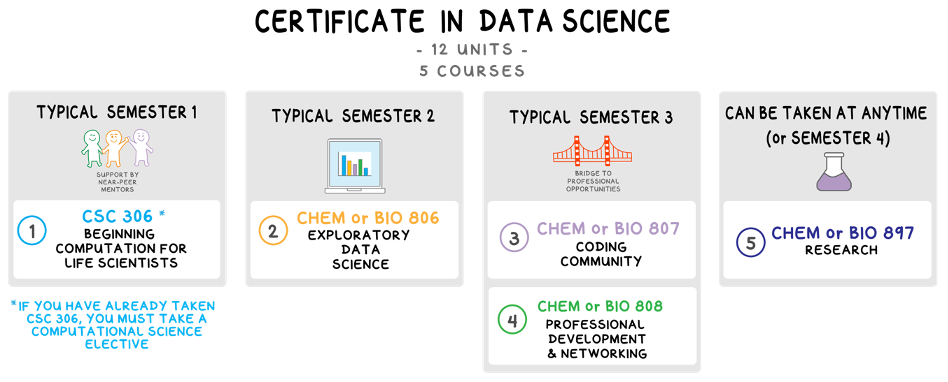
To earn a 12-unit graduate certificate in Data Science, you'll need to complete 5 classes.
GOLD classes are taught by faculty striving to incorporate scientific teaching techniques to improve student learning, and equity in the classroom. GOLD aims to provide courses that are engaging, inclusive, and relevant for SFSU biology and chemistry grad students.
While all students are welcome to take GOLD classes, in order to complete the whole certificate, we strongly recommend that incoming graduate students begin the course sequence their first semester.
Typical GOLD Semester 1: CSC 306
Note: If you have already taken CSC 306 or an equivalent course, you must take a computational science elective (some options below) to earn the 12 unit graduate certificate
CSC 306: An Interdisciplinary Approach to Computer Programming (3 units)
Term: Fall of first year in grad school
This course was designed for biology and chemistry students learning computer programming for the first time. Students will learn the basics of programming in the language Python with the support and mentorship of graduate CS students.
Computational Science Electives in Biology and Chemistry (in place of CSC 306 or equivalent):
- CHEM 370: Computer applications in Chemistry and Biochemistry (3 units)
- BIOL 446: Microbial Genomics (4 units)
- BIOL 458: Biometry (4 units)
- BIOL 490: Ecology of Infectious Diseases (4 units)
- BIOL 638/738: Bioinformatics and Genome Annotation (4 units)
- CHEM 870: Computational Methods in Chemistry (3 units)
- BIOL 677 Introduction to Optical Engineering for Biology Sciences (3 units)
- BIOL 815 Advanced Phylogenetic Analysis (4 units)
- BIOL 710 Advanced Biometry (3 units)
Typical GOLD Semester 2: BIOL/CHEM 806
BIOL 806/CHEM 806: Exploratory Data Science for Scientists (4 units)
Term: Spring of first year in grad school
Prerequisite: Graduate standing; or upper-division standing and CSC 306 or equivalent.
This course will build on students' background in computer programming to bring in data science philosophy and technical skills. The course will center on data science as applied to biology and chemistry research. Students will work in teams to gain skills in data preparation, analysis, and reporting using real-world scientific datasets.
Typical GOLD Semester 3: BIOL/CHEM 807 and BIOL/CHEM 808
BIOL 807/CHEM 807: Coding Community for Data Science Components of Independent Research Projects (1 unit)
Term: Fall of second year in grad school
Prerequisites: Graduate standing; BIOL 806/CHEM 806 or equivalent (concurrent enrollment recommended); or consent of the instructor.
This course will provide students a structure and community to apply their data science skills to their graduate research and thesis.
BIOL 808: Professional Prospects for Quantitative Biologists, Data Scientists, and Bioinformaticians (1 unit)
Term: Fall of second year in grad school
Prerequisite: BIOL 806/CHEM 806.
Students will connect with data scientists from Bay Area industries, universities, and government agencies. Through discussions with these guests, students will learn about current trends in the industry, specific positions and roles achievable for students post-graduation, CV composition, job interview skills, and professional experiences in a broad set of workplaces.
Any Semester Term: GOLD Research Course Requirement
BIOL 897/CHEM 897: Research (3 units)
Term: Any
Instructor: Thesis advisor
Students will use their coding skills to make progress on the Master's Research Project in their fields in Biology and Chemistry. This course is integrated into your planned thesis research